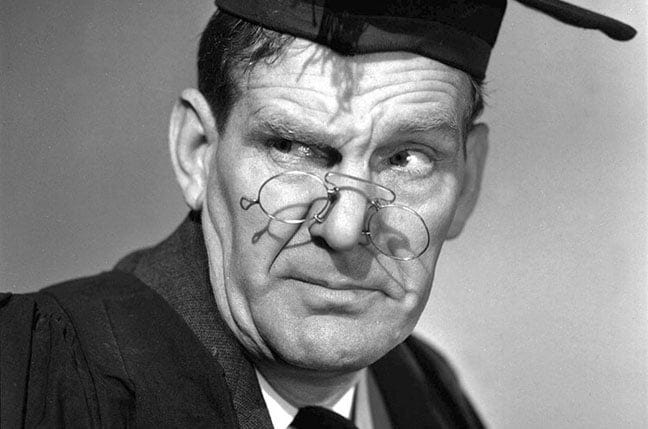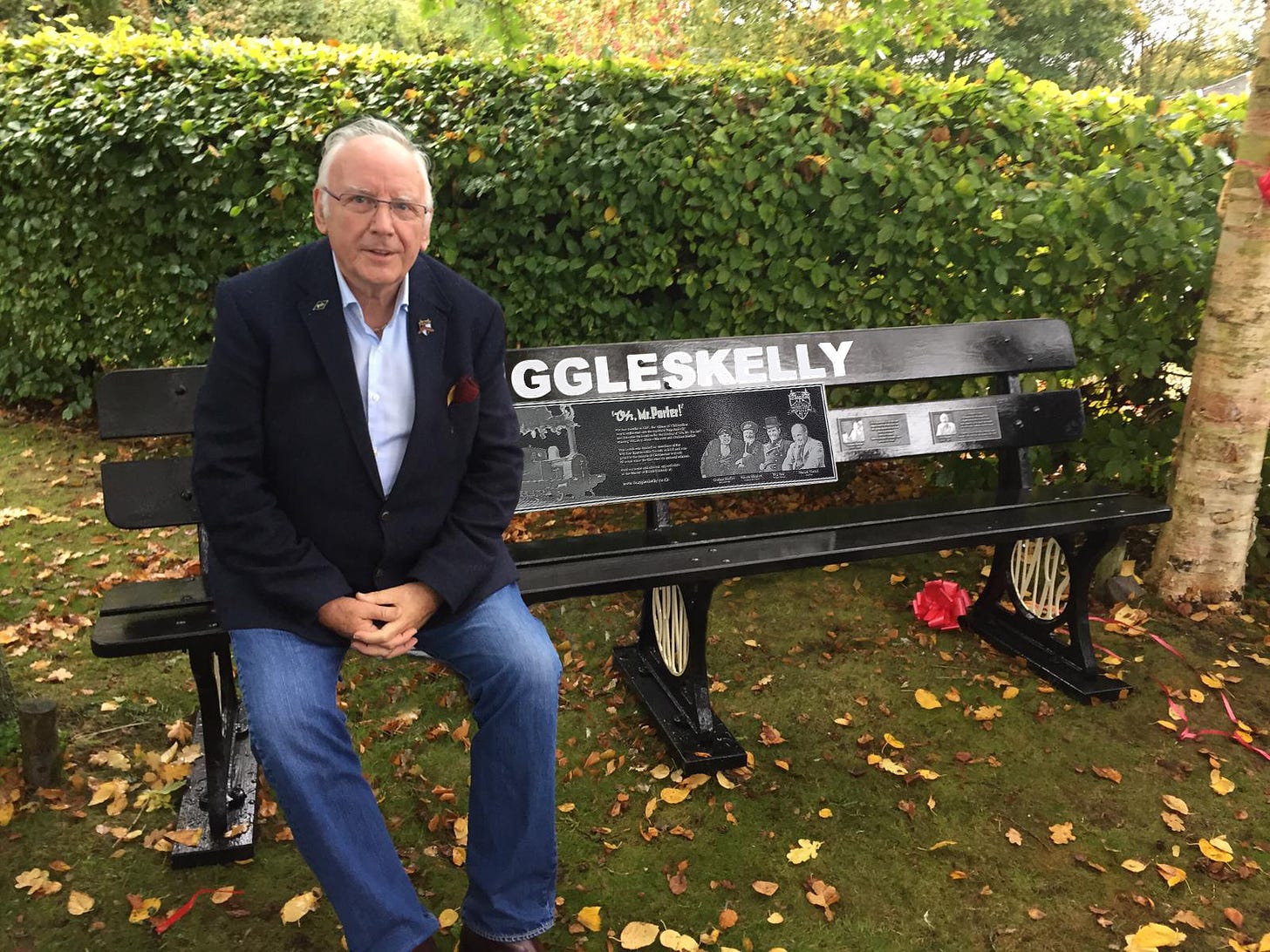Hi again, and thanks for reading! If you’re new here, welcome. If you’re old here, thanks for sticking with me!
This week I’m talking with Tom Marshall, the founder of the Will Hay Appreciation Society. I love a good appreciation society, don’t you? Those corners of Facebook with a real passion for their subject. I didn’t know anything about Will Hay before I met Tom, but it’s been a genuine pleasure to learn about Hay and watch his movies.
For this issue I’ve kept the majority of my chat with Tom in the audio version. The newsletter itself is informed by our chat but I’m leaving it as a bit of podcast style snippet at the end of the VoiceOver. There will also be a video version out next week on my shiny new YouTube channel.
As always, if you find this interesting and you know someone else who would too, you can forward this straight on to them!
An Introduction to Will Hay
Will Hay was one of the biggest names in British cinema in the 1930’s and into the 40’s. He made his name in the music halls playing a schoolmaster and toured all over the U.K. as well as the U.S, Canada, Australia and South Africa before making a successful move over to film. He had a wide variety of talents beyond acting, speaking three languages by the time he was 20, as well as being an astronomer and a pilot (he gave lessons to Amy Johnson who was the first female pilot to fly from London to Australia).
In 1914, he began working with Fred Carno, the theatre impresario who gave Charlie Chaplin and Stan Laurel their ticket to fame by touring their slapstick acts in the US. Although Hay toured, he remained in the UK developing his music hall act, the Schoolmaster.
What exactly was the Music Hall?
The music hall and its influence on British film and comedy is worth an issue of this newsletter in itself. Music halls were where the working class could go to spend any spare earnings they had during their time off and were usually heavily dependant on the profits of the alcohol consumed there! The tradition itself was born out of new laws around the working week. Working less than ten hours a day and having a weekend was new for most in the 19th century, so music halls were where workers could drink beer and watch a show when there was nothing else to do with your new found spare time.
The halls popularised many forms of entertainment: from music to stand-up and even ballet. The only thing they couldn’t show were plays, which you would have to have a licence for. If you had a theatrical licence at the time, that meant no alcohol, and you couldn’t have a music hall with no alcohol! So if you didn’t have a licence, that meant that you could pretty much do what you wanted so the music hall went pretty much unchecked for years.
Crucially though, music halls were a place where comedians honed their craft and became big names. They were bankable talent nationally and it’s easy to see why they would make an simple transition to the silver screen.
What made Will Hay different?
The crucial element of his music hall character, the Schoolmaster, was that he was the person of authority that had no idea what he was doing. He was a common worker who happened to land a job that he wasn’t suited for, and that provided an endless supply of situation comedy. The most obvious similarity I can think of today is in comedies like Bad Education, Stath Lets Flats and The Office. But there are countless others.
When moving to film, Hay adapted his formula to other characters,
“He was playing the school master, but he was mocking people in authority and that's how he got really popular with the masses…and he played that same character in different guises in different films. So in Mr. Porter and things like that, he's still playing the same kind of school master character who's bumbling and in a position where he doesn't actually know what he's doing.”
From 1934 to the end of the decade, Hay appeared in at least two films a year, 13 in total.
While I prepared for this newsletter I watched a couple of his films: Oh, Mr Porter! and Where’s that Fire. I could see Steptoe and Son, Dad’s Army and Only Fools and Horses in them. They had simple plots, but with witty banter between the characters that, if you’ve seen any British sitcom, you’ll understand their rhythms instantly. Have a look at this quick clip below and you’ll know exactly what I mean.
If they were so popular then, why are these films not still widely shown now?
It’s interesting, albeit a bit depressing to learn that one of the main reasons why Will Hay and his contemproaries aren’t still lauded in the same way today, could be down to the way the British film industry wanted to be seen abroad. The boss of Ealing said in 1945 that their movies should portray a “complete picture” of the UK, which looked like,
“Britain as a patron and parent of great writing, painting and music…as a questing explorer, adventurer and trader…as the home of great industry and craftsmanship…(and) as a mighty military power”1
There was also a desire to increase the budgets of the movies they were making, and show a quality that matched, and could be sold to, Hollywood.
The thing about comedy in 1930’s though is that they did not play ball with these ideals. Firstly, there were plenty of them, with 600 of the 1,741 British films released that decade being comedies with stars from the music hall, like Hay.
Secondly, they were cheap to make and critically they used the stars that had made their name among the working classes. These actors had regional accents and spoke the language of the people. These films were huge hits at home but were impossible to sell abroad. While the national film industry were pushing their agenda of Britishness, “Will Hay and others were indeed busy painting the national portrait”.
Talk to me about this appreciation society then.
I’ll let Tom take it from here…
A friend of my dad said, ‘you have to watch this DVD of Mr. Porter’. I’d Never heard of it, watched it…absolutely loved it. Then I went to uni and a couple years later I wrote my dissertation and decided to write it on Will Hay and his influence in comedy…
So what I did was I actually set up a Facebook group which was a few hundred people as a research base to see if there's anybody who remembered Will.
[It] laid dormant for a few years and gradually people started joining it and the interest was kind building…And so we had loads of people start joining. So much so that we had our first Will Hay Day in 2014.
We had Hay’s family members join society. So his Granddaughters are in the society. Graham's Grandchildren, loads of family members, basically.
So it's, yeah, it sort of spiraled from there. Now we're membership [of] just under 8,000 people.
On top of all this they crowdfunded for a bench to be placed in the town where Oh, Mr Porter was filmed, and Tom tours the region with his model railways that honours Will Hay’s legacy (by the way, his YouTube videos which show the making of this sets are mesmerising if you need to switch off for ten minutes).
There’s an absolute need for societies like Tom’s. Without them, I’m not sure that films like Will Hay’s would be remembered for much longer. A community of 8,000 strong wouldn’t have known that their memory of Hay was shared with others, and it’s one of the few good news items that social media has.
As for Hay’s legacy, he’s one of a relatively small band of comedy players that the UK’s strong sitcom genre has a lot to thank for. He was able to provide a framework for his characters that would work time and time again with that special ability of keeping his audience guessing with a base character they know all too well.
Will Hay’s films are widely available and free to watch on YouTube. I’ve linked some below if you would like to watch some. If this society seems like a bit of you, just search it on Facebook!
Next Train’s Gone! - Amanda J Field, Chaplin Books, 2015






Excellent Gareth, it was a pleasure speaking with you.